Conflict Zones
Yemen’s Houthis launch missiles at Israel, army says it intercepts | Houthis News
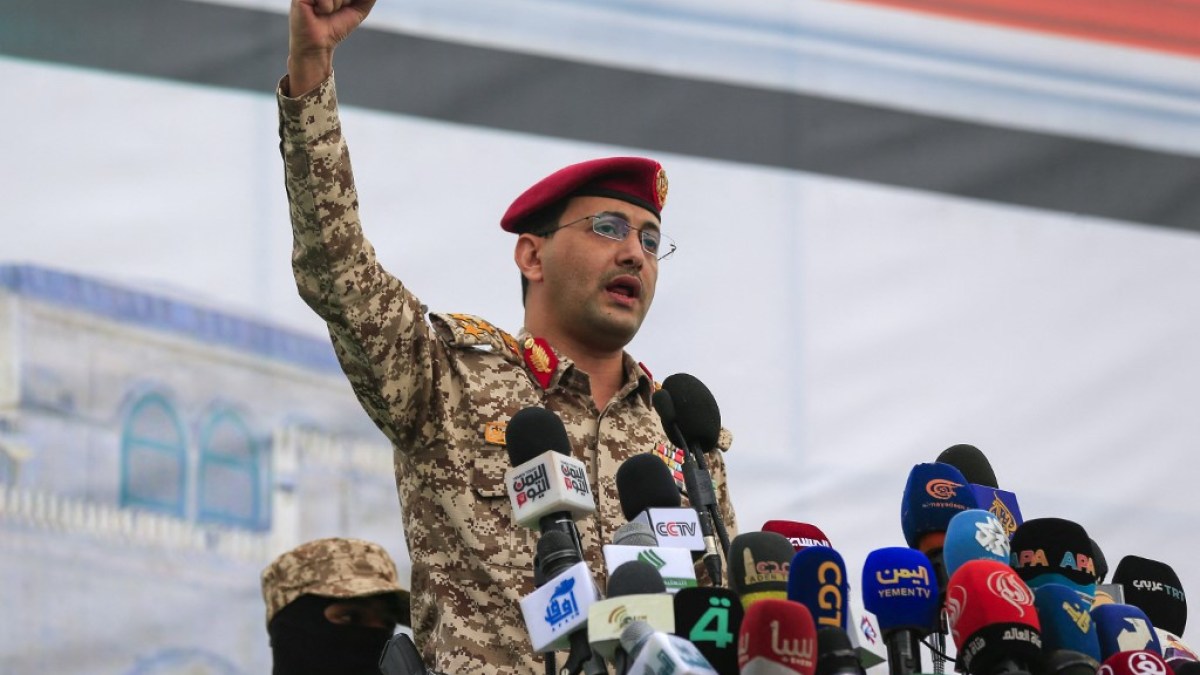
The group says it attacked an Israeli military base with a hypersonic missile.
Yemen’s Houthis have claimed responsibility for launching two missiles towards northern Israel, targeting the Ramat David military airbase and the Tel Aviv area, as the group continues its military pressure in solidarity with Palestinians under Israeli fire.
The Israeli military said on Friday it intercepted the first missile and launched another interceptor at the second, which was also fired from Yemen.
Alarms were triggered in several locations, though authorities reported no casualties or damage. The military added that the outcome of the second interception was still under review.
Yahya Saree, spokesperson for the Houthis – also known as Ansar Allah – confirmed the group had carried a “military operation” against a key Israeli military target.
Saree said hypersonic missiles were used and had successfully hit their intended destination.
The Israeli army responded that “interception attempts were made” without providing further details.
The Houthi group has repeatedly said its attacks on Israel as well as United States and British ships in the Red Sea and Bab al-Mandeb Strait will only cease if Israel agrees to a permanent Gaza truce.
The Houthis did not carry out attacks during the Gaza ceasefire earlier this year until Israel blocked all aid into the besieged enclave in early March and followed that with a full resumption of the war.
Growing civilian death toll
The attacks come as the US escalates its military operations in Yemen.
Since March, the US has launched large-scale attacks not only on infrastructure but increasingly on individuals linked to the Houthi leadership.
Civilian casualties are mounting, with UK-based monitor Airwars estimating between 27 and 55 civilians were killed in March alone, and suggesting April’s toll is even higher.
One of the deadliest US strikes in April hit Ras Isa port in Hodeidah, killing at least 80 people and wounding more than 150.
On Monday at least 68 people were killed in the overnight strike on detained African migrants, and eight people were killed around the capital, Houthi media reported.
Rights advocates have been alarmed about the growing civilian death toll. Three US Democratic senators recently wrote to Pentagon chief Pete Hegseth, demanding an accounting for civilian lives lost.
“Strikes pose a growing risk to the civilian population in Yemen,” United Nations spokesperson Stephane Dujarric said on Monday. “We continue to call on all parties to uphold their obligations under international humanitarian law, including the protection of civilians.”
Conflict Zones
Houthis maintain pressure on Israel as US launches more strikes on Yemen | Politics News
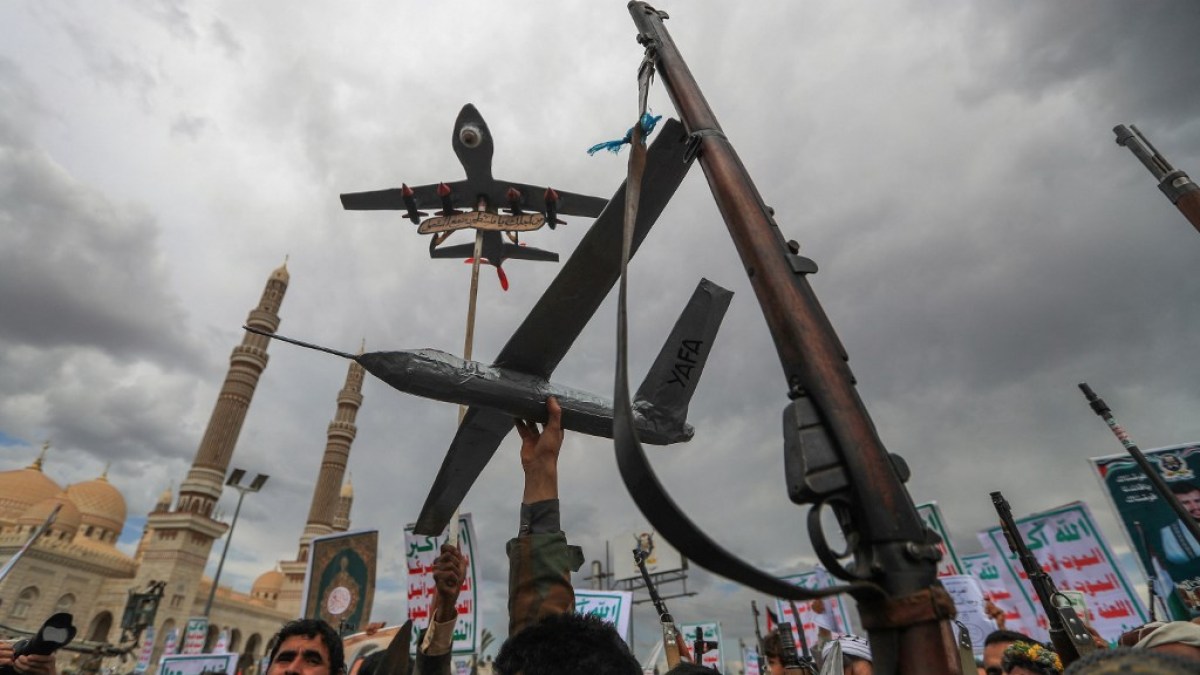
Prime minister of Yemen’s internationally recognised government has resigned amid political turmoil.
Israel has intercepted a missile fired from Yemen, the third such attack by Houthi forces in a 24-hour span, as the United States continues daily attacks on the country.
The Israeli army confirmed on Saturday it had activated air raid sirens across parts of the country following the missile launch.
No injuries or major damage were reported. Houthi spokesperson Yahya Saree claimed responsibility for the attack, calling it a response to Israeli operations in Gaza.
The Houthis have increasingly targeted Israel and shipping routes in the Red Sea, stating that their actions are acts of solidarity with Palestinians as Israel continues its assault on Gaza and the occupied West Bank.
The Houthis did not carry out attacks during the Gaza ceasefire earlier this year until Israel blocked all aid into the besieged enclave in early March and followed that with a full resumption of the war.
In the meantime, Houthi-affiliated Al Masirah TV reported on Saturday that the US launched two air raids on Yemen’s Kamaran Island and as-Salif district in the port city of Hodeidah.
The new attacks come a day after the same news outlet reported seven US attacks on the Ras Isa oil port in as-Salif district in Hodeidah. Last month, a US strike on the same port killed at least 80 people and wounded 150 in one of the deadliest attacks on the country by US forces.
The US has also ramped up its air campaign in Yemen, launching its most extensive military operations in the Middle East since President Donald Trump assumed office in January.
US forces claim to have struck Houthi positions, however, there have been numerous civilian casualties.
The high civilian toll from US strikes is drawing increasing alarm. The UK-based monitor Airwars reported that between 27 and 55 civilians were killed in March alone. April’s deaths are expected to be higher.
Houthi sources say at least 68 African migrants died in a single overnight strike on Monday, with additional casualties reported around the capital.
Yemen’s prime minister resigns
As the conflict intensifies, political instability is growing within Yemen.
Ahmed Awad bin Mubarak, the prime minister of the internationally recognised government, announced his resignation on Saturday, citing persistent challenges, including his inability to reshuffle the cabinet.
Government insiders said a power struggle with Presidential Council leader Rashad al-Alimi triggered Mubarak’s departure.
Within hours of the announcement, the presidential council named Finance Minister Salem Saleh bin Braik as prime minister, according to the state-run SABA news agency. The council also named bin Mubarak as an adviser to the ruling body, without addressing his claims.
Mubarak’s political career has been closely linked to the long-running war in Yemen. He rose to prominence after being abducted by Houthi fighters in 2015 while serving as chief of staff to then-president Abd-Rabbu Mansour Hadi.
Much of the international community does not recognise the Houthis, also known as Ansar Allah (supporters of God), even though the armed Iran-aligned group controls most parts of Yemen, including the capital, Sanaa, and some of the western and northern areas close to Saudi Arabia.
Conflict Zones
‘Don’t see a major war with India, but have to be ready’: Pakistan ex-NSA | Border Disputes News
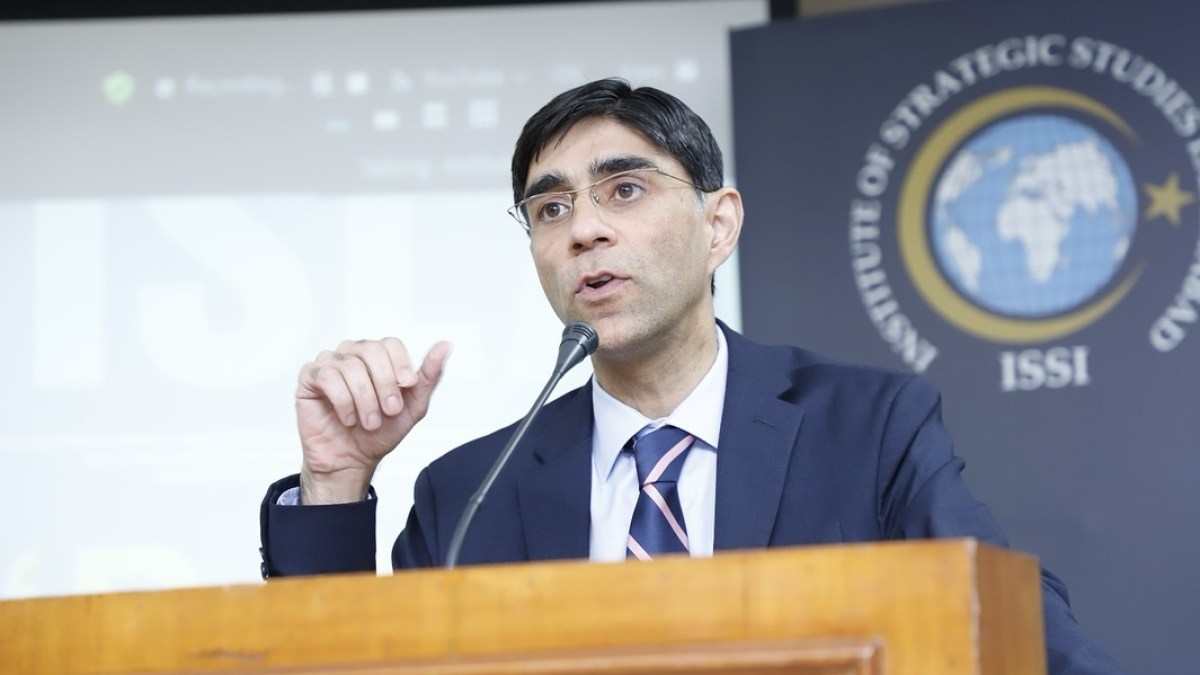
Islamabad, Pakistan – Eleven days after gunmen shot 26 people dead in the scenic valley of Baisaran in Indian-administered Kashmir’s Pahalgam, India and Pakistan stand on the brink of a military standoff.
The nuclear-armed neighbours have each announced a series of tit-for-tat steps against the other since the attack on April 22, which India has implicitly blamed Pakistan for, even as Islamabad has denied any role in the killings.
India has suspended its participation in the Indus Waters Treaty that enforces a water-sharing mechanism Pakistan depends on. Pakistan has threatened to walk away from the 1972 Simla Agreement that committed both nations to recognising a previous ceasefire line as a Line of Control (LoC) – a de-facto border – between them in Kashmir, a disputed region that they each partly control but that they both claim in its entirety. Both nations have also expelled each other’s citizens and scaled back their diplomatic missions.
Despite a ceasefire agreement being in place since 2021, the current escalation is the most serious since 2019, when India launched air strikes on Pakistani soil following an attack on Indian soldiers in Pulwama, in Indian-administered Kashmir, that killed 40 troops. In recent days, they have traded fire across the LoC.
And the region is now on edge, amid growing expectations that India might launch a military operation against Pakistan this time too.
Yet, both countries have also engaged their diplomatic partners. On Wednesday, United States Secretary of State Marco Rubio called Pakistani Prime Minister Shehbaz Sharif and Indian Foreign Minister S Jaishankar, urging both sides to find a path to de-escalation. US Defence Secretary Pete Hegseth called his Indian counterpart, Rajnath Singh, on Thursday to condemn the attack and offered “strong support” to India.
Sharif met envoys from China, Saudi Arabia and the United Arab Emirates, three of Pakistan’s closest allies, to seek their support, and urged the ambassadors of the two Gulf nations to “impress upon India to de-escalate and defuse tensions”.
To understand how Pakistani strategists who have worked on ties with India view what might happen next, Al Jazeera spoke with Moeed Yusuf, who served as Pakistan’s national security adviser (NSA) between May 2021 and April 2022 under former Prime Minister Imran Khan.
Prior to his role as NSA, Yusuf also worked as a special adviser to Khan on matters related to national security starting in December 2019, four months after the Indian government, under Prime Minister Narendra Modi, revoked the special status of Indian-administered Kashmir.

Based in Lahore, Yusuf is currently the vice chancellor of a private university and has authored and edited several books on South Asia and regional security. His most recent book, Brokering Peace in Nuclear Environments: US Crisis Management in South Asia, was published in 2018.
Al Jazeera: How do you assess moves made by both sides so far in the crisis?
Moeed Yusuf: India and Pakistan have for long struggled in terms of crisis management. They don’t have a bilateral crisis management mechanism, which is the fundamental concern.
The number one crisis management tool used by both sides has been the reliance on third parties, with the idea being that they would try and restrain them both and help de-escalate the crisis.
This time, I feel the problem India has run into is that they followed the old playbook, but the leader of the most important third party, the United States, didn’t show up to support India.
It appears that they have so far taken a neutral and a hands-off position, as indicated by President Donald Trump few days ago. (Trump said that he knew the leaders of both India and Pakistan, and believed that they could resolve the crisis on their own.)
Pakistan’s response is directly linked to the Indian response, and that is historically how it has been, with both countries going tit-for-tat with each other. This time too, a number of punitive steps have been announced.
The problem is that these are easy to set into motion but very difficult to reverse, even when things get better, and they may wish to do so.
Unfortunately, in every crisis between them, the retaliatory steps are becoming more and more substantive, as in this case, India has decided to hold Indus Water Treaty in abeyance, which is illegal as the treaty provides no such provision.
Al Jazeera: Do you believe a strike is imminent and if both sides are indicating preparedness for a showdown?
Yusuf: In such moments, it is impossible to say. Action from India remains plausible and possible, but the window where imminence was a real concern has passed.
What usually happens in crises is that countries pick up troop or logistics movements, or their allies inform them, or they rely on ground intelligence to determine what might happen. Sometimes, these can be misread and can lead the offensive side to see an opportunity to act where none exists or the defensive side to believe an attack may be coming when it isn’t the case.
Pakistan naturally has to show commitment to prepare for any eventuality. You don’t know what will come next, so you have to be ready.
Having said that, I don’t think we are going to see a major war, but in these circumstances, you can never predict, and one little misunderstanding or miscalculation can lead to something major.
Al Jazeera: How do you see the role of third parties such as the US, China and Gulf States in this crisis, and how would you compare it with previous instances?
Yusuf: My last book, Brokering Peace (2018) was on the third-party management in Pakistan-India context, and this is such a vital element for both as they have internalised and built it into their calculus that a third-party country will inevitably come in.
The idea is that a third-party mediator will step in, and the two nations will agree to stop because that is what they really want, instead of escalating further.
And the leader of the pack of third-party countries is the United States since the Kargil war of 1999. (Pakistani forces crossed the LoC to try to take control of strategic heights in Ladakh’s Kargil, but India eventually managed to take back the territory. Then-US President Bill Clinton is credited with helping end that conflict.)
Everybody else, including China, ultimately backs the US position, which prioritises immediate de-escalation above all else during the crisis.
This changed somewhat in the 2016 surgical strikes and 2019 Pulwama crisis when the US leaned heavily on India’s side, perhaps unwittingly even emboldening them to act in 2019.
(In 2016, Indian troops launched a cross-border “surgical strike” that New Delhi said targeted armed fighters planning to attack India, after gunmen killed 19 Indian soldiers in an attack on an army base in Uri, Indian-administered Kashmir. Three years later, Indian fighter jets bombed what New Delhi said were bases of “terrorists” in Balakot, in Pakistan’s Khyber Pakhtunkhwa province, after the attack on the Indian military convoy in which 40 soldiers were killed. India and Pakistan then engaged in an aerial dogfight, and an Indian pilot was captured and subsequently returned.)
However, this time, you have a president in the White House who turned around and told both Pakistan and India to figure it out themselves.
This, I think, has hurt India more than Pakistan, because for Pakistan, they had discounted the possibility of significant US support in recent years, thinking they have gotten too close to India due to their strategic relationship.
But India would have been hoping for the Americans to put their foot down and pressure Pakistan, which did not exactly materialise. Secretary of State Marco Rubio’s phone call again is playing down the middle, where they are telling both the countries to get out of war.
So, what they have done has, oddly enough, still played a role in holding India back so far, since India didn’t (so far) feel as emboldened to take action as they may have during Pulwama in 2019.
Gulf countries have played a more active role than before. China, too, has made a statement of restraint.

Al Jazeera: How has Pakistan’s relationship with India evolved in recent years?
Yusuf: There has been a sea change in the relationship between the two countries. When I was in office, despite serious problems and India’s unilateral moves in Kashmir in 2019, we saw a ceasefire agreement on the Line of Control as well as back-channel talks.
We have tried to move ahead and reduce India’s incentive to destabilise Pakistan, but I think India has lost that opportunity due to its own intransigence, hubris and an ideological bent that continues to force them to demean and threaten Pakistan.
That has led to a change in Pakistan as well, where the leadership is now convinced that the policy of restraint did not deliver, and India has misused and abused Pakistan’s offers for dialogue.
The view now is that if India doesn’t want to talk, Pakistan shouldn’t be pleading either. If India does reach out, we will likely respond, but there isn’t any desperation in Pakistan at all.
This is not a good place to be for either country. I have long believed and argued that ultimately for Pakistan to get to where we want to go economically, and for India to get to where it says it wants to go regionally, it cannot happen unless both improve their relationship. For now, though, with the current Indian attitude, unfortunately, I see little hope.
Al Jazeera: Do you anticipate any direct India-Pakistan talks at any level during or after this crisis?
Yes – I don’t know when it will be, or who will it be through or with, but I think one of the key lessons Indians could probably walk away with once all this is over is that attempting to isolate Pakistan isn’t working.
Indus Water Treaty in abeyance? Simla Agreement’s potential suspension? These are major decisions, and the two countries will need to talk to sort these out, and I think at some point in future they will engage.
But I also don’t think that Pakistan will make a move towards rapprochement, as we have offered opportunities for dialogues so many times recently to no avail. As I said, the mood in Pakistan has also firmed up on this question.
Ultimately, the Indians need to basically decide if they want to talk or not. If they come forth, I think Pakistan will still respond positively to it.
*This interview has been edited for clarity and brevity.
Conflict Zones
‘Everyone lives in fear’: Voices of Kashmir after deadly Pahalgam attack | Armed Groups
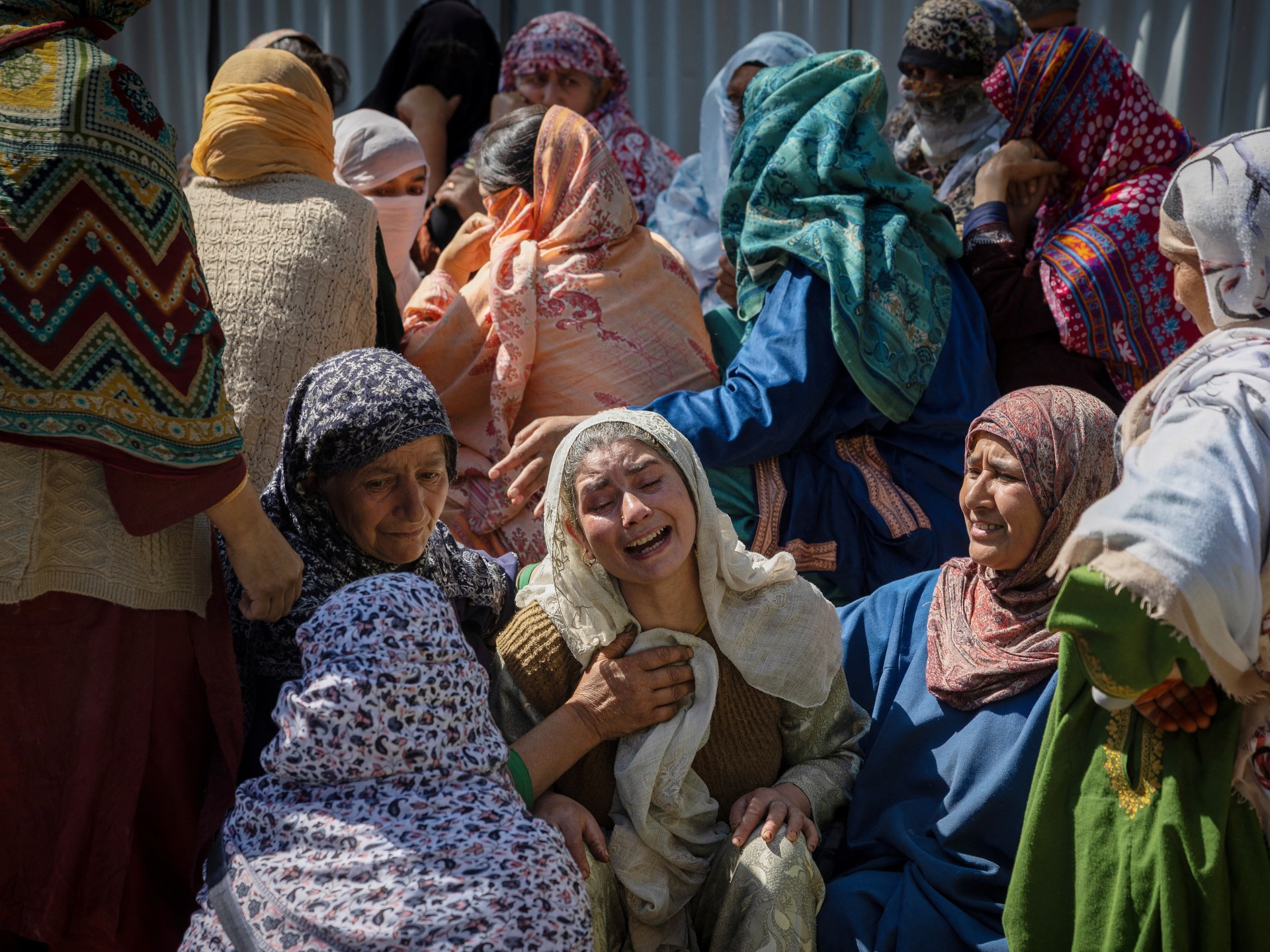
Srinagar, Indian-administered Kashmir — India and Pakistan are on edge, amid speculation that New Delhi might launch a military operation against its western neighbour days after the deadly attack on tourists in Pahalgam in Indian-administered Kashmir.
On the afternoon of April 22, suspected rebels emerged from the forests into a picturesque meadow in Pahalgam accessible only by foot or horseback, and opened fire on male tourists. They killed 25 tourists and a local Kashmiri pony rider.
The worst such attack in Kashmir in a quarter-century set off a spiral of tit-for-tat steps by India and Pakistan that have brought the nuclear-armed neighbours to the brink of military conflict.
Yet while India blames Pakistan for the attack, and Islamabad accuses New Delhi of not sharing any evidence to back its claims, Kashmir is facing the brunt of their tensions.
India has responded to the Pahalgam attack with a spree of detentions of people suspected of supporting secessionist groups; and raids and demolitions of the homes of rebels, in the part of Kashmir it administers. It has also temporarily shut down tourism in parts of the Kashmir valley. It is also expelling Pakistanis living in India and Indian-administered Kashmir – including the families of former rebels New Delhi had previously invited as a part of a rehabilitation programme.
Meanwhile, dozens of Kashmiris in cities across India have reported facing harassment, physical assault and threats to leave.
Al Jazeera spoke to people living in the region about how their lives have been affected by the Pahalgam attack.

Ashiq Nabi, 35, adventure tour operator
I was in Pahalgam when the attack took place. It was shocking for all of us.
As an architect and tourism planner focused on developing adventure tourism in Kashmir, I experienced the immediate fallout of the incident.
The government’s decision to suspend all trekking activities and close 48 tourist destinations following the attack has directly impacted my work. The months of planning, coordination with local partners and scheduled expeditions were brought to an abrupt halt.
The attack led to mass cancellations, financial losses, and the dismissal of local guides, porters, and service staff – many of whom rely entirely on seasonal tourism for income.
The impact extended beyond businesses; it shook the confidence of tourists and disrupted the livelihoods of hundreds of people across the tourism value chain.
My years of work to brand Kashmir as a safe, adventure-friendly destination have been lost abruptly. My work has taken a significant hit, but I hope that things will improve, tourists will come back and the sector will revive.
I am very stressed about my livelihood right now but there is no option but to hope.

Rameez Ahmad, 40, a tourist taxi driver
What happened in Pahalgam should never have happened.
Incidents like that don’t just create panic, they destroy our only source of livelihood. Since that day, the number of tourists has dropped so badly that I have spent these days without a single ride.
I sit idle, waiting near taxi stands or at home, hoping someone might call me but the phone just does not ring any more.
Since March, this year had started with some hope. Bookings were picking up, and it felt like we might finally see a good season after years of struggle. But now everything has come crashing down.
I fear that if this continues, people like me, who have no government job, no land, no business, will be left penniless.
We survive on tourism and this incident has been a big setback as I am left with no other option. I don’t have savings to fall back on. I have a family to support, children to educate and loans to repay. When tourists don’t come, it’s not just a bad day at work, it’s a question of how we will eat tomorrow.

*Amir Ahmad 26, a job aspirant
I was staying in a rented room in Srinagar [Indian-administered Kashmir’s main city] when the Pahalgam incident took place. Following reports of youth being picked up across Kashmir, I was urgently called back home [in central Kashmir’s Ganderbal district].
A few months earlier, I was summoned to the local police station over a social media post which they did not like. I was let off with a warning and sent home. Since returning from my rented accommodation, I have been confined to my house. My parents don’t allow me to step outside. Every time I get a call, I feel a wave of anxiety, fearing it might be the police.
My mother was scheduled to travel to Delhi in a few days for open-heart surgery, but now she is too afraid to go. One of my friends who is a student recently returned and warned us that it is extremely dangerous to travel under the current circumstances. He was studying in Punjab and had to rush home after attacks on Kashmiri students.
Our lives have become so uncertain that we do not know whether we should worry about two meals, our job, our education, our homes being demolished or the political uncertainty that is shaping up.
Kashmir might be a wonderland, a mini-Switzerland or a paradise for others, but for us, it is an open prison. Everyone lives in fear. What future do we have?

Ajmal, 21, migrant worker from Bihar
My sister has been living in Kashmir with her husband and children for over a decade.
A few years ago, she brought me here as well. She had never once complained about facing any harm. In fact, she would always speak highly of the locals and their warmth. That is what encouraged me to come and try building a life here, too. I sell pani puri [a popular street snack in South Asia] on a cart and earn my livelihood. The weather is also good here.
When the attack on tourists happened, it did create fear on the first day. We were very scared not knowing what would happen. But things are returning to normal slowly and people are gradually returning to their daily routine. I continue to run my stall and even close it late in the evening without much worry. We are feeling safe so far.
The atmosphere here, at least for now, doesn’t feel threatening to outsiders.

*Safiya Jan, 40
I am originally from Karachi [in Pakistan]. I came to Kashmir in 2014 under the rehabilitation policy announced by the [Indian] government for the families of the former rebels who had gone to Pakistan but gave up guns and settled there.
After marrying my husband, who is from Baramulla in north Kashmir, I came to Kashmir. For the past decade, I have been living here with him and our two daughters. This is our home now.
When I hear today that Pakistani residents are being sent back, I get anxious. My heart breaks. I don’t want to go back. How can I leave my husband and children behind and return alone? I would rather die than be separated from my family. I beg the government, with folded hands, please don’t send us away.
My daughters are studying here. We have built a life in Kashmir, brick by brick, year after year. We are not a threat to anyone. All we want is to live in peace, together as a family.
If I am sent back, it is like cutting an arm or leg from the body, who on Earth would do that?
*The names of Amir and Safiya have been changed at their request for their safety.
-

 Middle East2 days ago
Middle East2 days agoSyrian Druze leader condemns government over sectarian violence | News
-

 Middle East1 day ago
Middle East1 day agoICJ hearing on Israel’s obligation to allow aid to Palestine: Key takeaways | Israel-Palestine conflict News
-

 Sports2 days ago
Sports2 days agoCoco Gauff hands Iga Świątek one of the worst defeats of her career to reach Madrid Open final
-

 Lifestyle2 days ago
Lifestyle2 days agoBlack dandyism etches place into Met Gala history — and global visibility
-

 Lifestyle2 days ago
Lifestyle2 days agoAP PHOTOS: Artists in this former pasta factory preserve Italian opera traditions
-
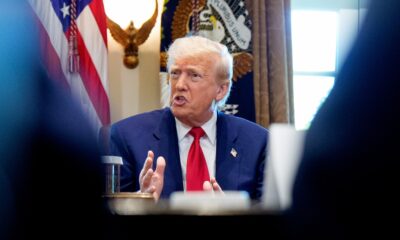
 Education1 day ago
Education1 day agoTrump says he will revoke Harvard’s tax-exempt status
-

 Middle East1 day ago
Middle East1 day agoDrones hit ‘Freedom Flotilla’ Gaza aid ship in international waters | Israel-Palestine conflict News
-

 Europe1 day ago
Europe1 day agoAnalysis: US tariffs could make Europe ‘Great Again’ by lowering prices




